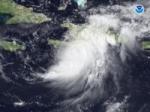Gustav Moves On - Can Haiti Weather the Next Storm?
 Natural disasters are a fact of life in Haiti, both in terms of the inevitable tropical storms/hurricanes and the floods/ mudslides left in their wake, largely as a result of the unabated deforestation. Gustav resulted in 22 deaths, but certainly could have been worse. While Haiti can't stop the storms, it is possible to mitigate the damage that they cause. Preparedness is key. Topix carried a Scoop Media World article on the efforts of the international community to help Haiti better prepare for and respond to natural disasters.
Natural disasters are a fact of life in Haiti, both in terms of the inevitable tropical storms/hurricanes and the floods/ mudslides left in their wake, largely as a result of the unabated deforestation. Gustav resulted in 22 deaths, but certainly could have been worse. While Haiti can't stop the storms, it is possible to mitigate the damage that they cause. Preparedness is key. Topix carried a Scoop Media World article on the efforts of the international community to help Haiti better prepare for and respond to natural disasters.
The United Nations Development Program (UNDP) has been working with Haiti's national disaster risk management system since 1999, when the government established a national civil protection programme in response to the damage caused by Hurricane George in 1998. Hurricane George was particularly devastating - you can still see its impact on many small villages. Even today when Haitians want to say that something will shock you, they may say "W'ap konn George" (You're going to get to know George).
Disaster mitigation programs can create livelihoods and improve the environment. In urban areas, one simple step is to make possible jobs cleaning out canals clogged with plastic bottles, of which there are many in Port au Prince. UNDP also is running a pilot program, scheduled for expansion, where full and part time employees collect garbage which is recycled into briquettes that can be cooked with, instead of wood charcoal.
The article also notes the important logistical support provided by MINUSTAH in rapidly evacuating thousands of vulnerable Haitians in the West, South-East, and Nippes Departments. MINUSTAH is not going anywhere soon, but neither will it be there forever. Building up the capacity of the government at the central, regional, and local levels to prepare for and respond to disasters is essential but so to is building the capacity of communities. One of the best ways to do this is to bolster the Haitian Red Cross, which is active (to varying degrees) throughout the country.
USAID also supports programs to build the disaster preparedness/response capacity of the Haitian Government. These programs include trainings for local disaster mitigation committees and government disaster response officials. USAID collaborated with UNDP, the Inter-American Development Bank (IDB) and the European Union (EU) to develop Haiti's National System for Disaster and Risk Management. Construction has also begun on the government's new emergency response center. The World Bank has also made some funding available to support risk management at the community level.
Below is the article on UNDP disaster preparedness/response programs in Haiti. You can also find more information on the UNDP/Haiti website which is in French and Kreyol. Click here to view USAID/Haiti supported disaster programs.
---------------------
Haiti: UN Agency Helps Contain Damage Wrought By Deadly Hurricane
Initiatives by the United Nations Development Programme (UNDP) in Haiti are helping to rein in the damage wrought by Hurricane Gustav, which has claimed nearly two dozen lives so far across the Caribbean region.
The agency credits projects aimed at curbing flooding in some of the poorest neighbourhoods – including Cité Soleil and Martissant – in the capital, Port-au-Prince, with mitigating the effects of the massive storm which made landfall on Monday.
“While there are many areas which experienced serious flooding and, tragically, casualties in particular in the south, the scale of the damage in Port-au-Prince does not seem to be as extensive as we have seen in the past,” said Joel Boutroue, UN Humanitarian Coordinator, who has been assessing the destruction resulting from the hurricane, which caused major flooding and mudslides.
Thousands of Haitians were evacuated by boat or truck from their homes in the West, South-East and Nippes departments with the help of blue helmets serving with the UN peacekeeping mission in Haiti MINUSTAH.
Previously, massive trash piles would block drainage canals, leading to severe flooding. Extensive cleaning projects by the Government and the international community are helping to mitigate that problem. For its part, UNDP is helping through a scheme to collect garbage in a large slum to be recycled into energy to cook food. Haiti, already burdened with huge social, economic and environmental challenges, is vulnerable to tropical storms – which can impede development efforts – during the Atlantic hurricane season, which stretches from June until November. Gustav has fluctuated in strength from a tropical storm to a hurricane as it has crossed the Caribbean.
Over 3,000 Haitians died and a further 300,000 were affected by tropical storm Jeanne in 2004, costing the country $265 million, or equivalent to 7 per cent of gross national product (GNP).
UNDP Administrator Ad Melkert, who was on a visit to the Caribbean nation, extended his tour to accompany Mr. Boutroue on his assessment mission. He held talks with President Rene Préval and met with Cabinet ministers, focusing on the role of the international community in tackling poverty and helping Haiti to rebuild from years of stalled development.
“In my view, there are three vital areas for progress in Haiti: employment, energy, and environment,” Mr. Melkert said. “Currently, Haitians have huge unemployment, limited access to energy, and severe environmental degradation.” He said that the international community, working in tandem with the Government, “should invest in policies and programmes which link these issues in a sustainable way.”
Add new comment